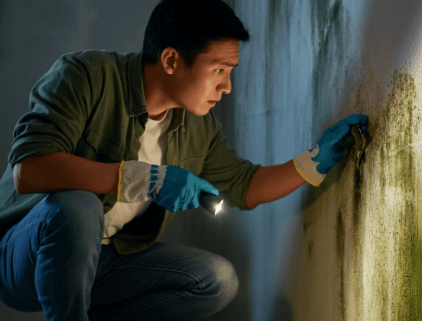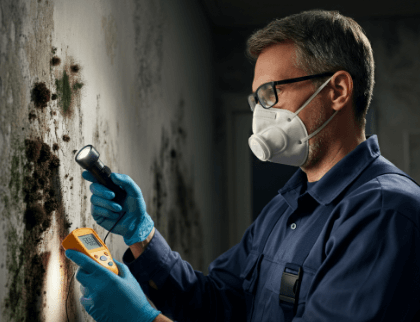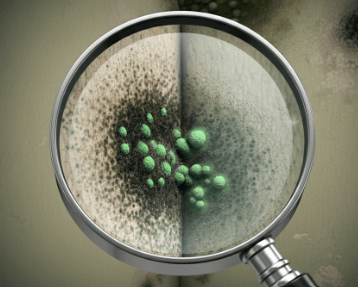In the sunny state of Florida, homeowners bask in the warmth and beauty of tropical weather. However, this idyllic climate comes with challenges, notably the hidden menace of mold growth. “Finding Mold in Florida Homes” is not just about locating unsightly spots on walls or ceilings; it is a critical endeavor for ensuring the health and safety of your living environment. In this blog, we’ll look in-depth at uncovering mold’s stealthy threat, emphasizing the importance of “Finding Mold in Florida Homes.” We aim to empower you with the expertise and skills to recognize, tackle, and prevent mold, protecting your home and loved ones from its potential harm.
Steve Daria and Joleigh, seasoned real estate investors, have renovated several Florida properties and faced mold challenges. Through their experiences, they’ve become adept at finding mold in Florida homes and understanding its implications for property value and health. Their insights are invaluable for homeowners looking to protect their investments and well-being in Florida’s humid climate.
Understanding Mold in Florida Homes
Before discussing finding mold in Florida Homes, it’s crucial to understand that mold is a common problem in Florida due to its warm, humid climate. Mold spores are everywhere and can infiltrate homes through various means.
Once inside, they require moisture, warmth, and an organic nutrient source to thrive.
Florida’s homes, abundant with organic building materials like wood and drywall, are particularly vulnerable to mold.

The Serious Ramifications of Mold
Mold destroys the structure of your home and poses serious health risks.
Mold exposure can cause respiratory problems, nasal congestion, skin irritation, and worsen allergies.
Long-term exposure to toxic molds can lead to more severe health issues.
Conducting a Visual Mold Inspection
Visual inspections are the first line of defense against mold infestations.
Regularly inspect moisture-prone areas, such as bathrooms, kitchens, and basements. Look for any signs of mold, including discoloration, fuzziness, and a musty odor.
Thoroughly examine hidden spots behind and underneath appliances, cabinets, and closets.
Get An Offer Today, Sell In A Matter Of Days…
Understanding Mold Testing
Mold testing provides definitive evidence of mold presence in your home.
DIY mold test kits are cost-effective and easy to use but may not differentiate between types or concentrations of mold.
Professional testing by mold inspectors is more accurate and provides comprehensive reports detailing the type and quantity of mold present.
Utilizing Mold-Detecting Equipment
Technology can aid in mold detection.
Moisture meters identify high moisture levels in building materials, indicating potential mold growth.
Thermal imaging devices detect temperature variations within walls, revealing areas of hidden mold growth.
Identifying the 5 Most Common Types of Household Mold
Awareness of common mold species helps in early detection and appropriate remediation. In Florida, the hot and humid climate serves as a breeding ground for various types of mold.
Among the most common found in households are:
1. Stachybotrys Chartarum (Black Mold)
Notorious for its black appearance, this mold thrives in areas with high humidity and extensive water damage.
It can pose serious health risks, including respiratory issues.
2. Aspergillus
This mold is commonly found in food and air conditioning systems, contributing to allergic reactions and respiratory infections.
3. Cladosporium
Preferring cooler areas, Cladosporium can be found on fabrics and wood surfaces.
It can cause allergic reactions but is generally less harmful than black mold.
4. Penicillium
Penicillium, easily identified by its distinct blue or green color, spreads rapidly and is commonly present on water-damaged materials
This mold can cause sinus infections and inflammation of the lungs.
5. Alternaria
Typically found in showers, under sinks, or around windows, Alternaria is distinguished by its velvet-like texture and dark green or brown color.
Being exposed to this mold may trigger allergies and asthma attacks.
Taking Immediate Action If You Find Mold
When mold is discovered in your Florida home, prompt and decisive action is imperative to prevent further damage and mitigate health risks.
- The first step is identifying and addressing the moisture source fueling the mold growth. This may include repairing leaks, improving ventilation, or addressing humidity issues within the home. Eliminating the moisture source can halt the conditions, allowing mold to thrive and curtailing its spread and recurrence.
- Once the moisture source is remedied, it’s crucial to separate the affected area to avoid the spread of mold spores to other areas of the home. This can be achieved by sealing off the contaminated area with plastic sheeting and shutting down HVAC systems to prevent the dispersal of spores through the air ducts.
- Next, the mold must be thoroughly cleaned or removed, depending on the extent of the infestation. Small areas of mold growth can often be addressed with a mixture of soap and water, while larger infestations or toxic molds may require professional remediation.
- Damaged parts such as drywall, carpeting, or insulation may need to be repaired or discarded to prevent mold growth and structural damage.
- Finally, implementing measures to prevent future mold growth, such as improving ventilation, using dehumidifiers, and maintaining regular cleaning routines, is essential to safeguarding your home against recurring mold issues.
Engaging in Regular Mold Inspections
Prevention is critical to managing mold.
Schedule professional mold inspections annually, especially if you’ve had mold problems or live in a humid area.
Conduct routine DIY checks for signs of water damage and musty odors between professional inspections.

FAQs About Finding Mold in Florida Homes
Below are answers to some of the most common questions homeowners have about finding mold in Florida homes, a crucial step in maintaining a healthy living environment.
How do I stop mold from growing in my Florida home?
Prevent mold by controlling indoor humidity, having exhaust fans in bathrooms and kitchens, addressing leak problems promptly, and ensuring proper ventilation.
Are there natural methods available for mold removal?
Natural mold removal agents include vinegar, hydrogen peroxide, and baking soda.
However, professional remediation may be necessary for extensive mold infestations.
Is black mold always toxic?
While Stachybotrys chartarum (black mold) is infamous, not all black molds are toxic.
It’s essential to identify the specific type of mold present.
Can I clean mold myself, or do I need professional help?
You can clean small areas where mold has grown yourself using soap and water.
However, for larger infestations or toxic molds, professional remediation is recommended.
Conclusion
Mold detection and remediation are essential for homeownership, especially in Florida’s humid climate. By understanding the causes of mold growth, conducting regular inspections, utilizing detection tools, and taking swift action when necessary, homeowners can protect their property and health from the hazards of mold infestations. With proactive measures and vigilance, you can ensure a mold-free environment and enjoy your Florida home to the fullest.
**NOTICE: Please note that the content presented in this post is intended solely for informational and educational purposes. It should not be construed as legal or financial advice or relied upon as a replacement for consultation with a qualified attorney or CPA. For specific guidance on legal or financial matters, readers are encouraged to seek professional assistance from an attorney, CPA, or other appropriate professional regarding the subject matter.

